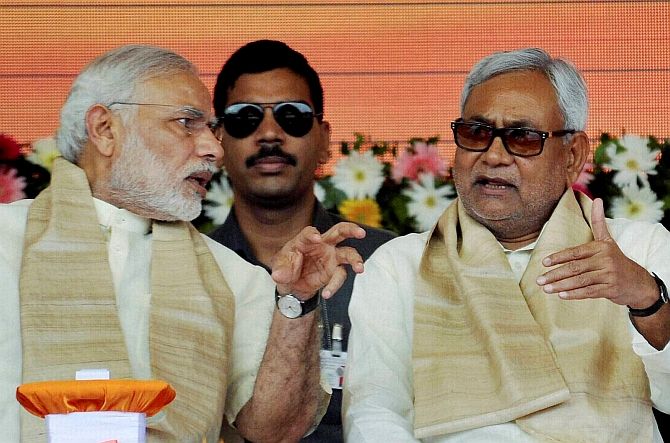'Only the prime minister can take the initiative in reaching out to his opponents. The fact that he has been reluctant to do so, leaving it to the Arun Jaitleys and Venkaiah Naidus to hold out the olive branch, has given the Opposition the chance of pointing to his aloofness,' says Amulya Ganguli.

Imagine the political buzz if Narendra Modi had responded positively to Nitish Kumar's personal invitation to attend the swearing-in ceremony in Patna.
If the prime minister had dropped in at the Gandhi Maidan for, say, an hour or so and mingled with the guests, would it have been regarded as a master stroke or be seen as a meaningless theatrical gesture with no long-term consequences ?
Irrespective of the fallout, the visitation -- to use a pompous word -- would have undoubtedly caused an uncommon political stir. The reason is that it would have been a 'first' -- and might even set a precedent.
Since Modi himself had resorted to out-of-the-box thinking to invite the heads of governments of the SAARC countries to his own swearing-in, he cannot be averse to setting a similar example at the national level, where a prime minister turns up to congratulate a hugely successful chief minister.
Moreover, such a step would have enabled Modi to put an end to the bitterness which marked both his relations with Nitish Kumar and the election campaign.
All the jibes about the DNA of betrayal in the Bihari mentality, the irrelevance of a 'bahari' (outsider) and about celebrations in Pakistan at the Mahagathbandhan's victory would have been forgotten -- at least for some time as a result of Modi's and Nitish's selfies.
The other guests, including Rahul Gandhi, could not but have been taken aback with the unlikely presence in their midst of the man they were supposedly ganging up against. For the sake of polite formality, however, they would have had no option but to be all smiles and have a friendly powwow.
At the current stage of Indian politics, where Parliament is routinely disrupted session after session and the government's reforms programmes are stalled as an act of retribution by the Opposition against the ruling party's past indiscretions, there is need for an unusual gesture to restore a sense of normality in inter-party relations.
Only the prime minister can take the initiative in reaching out to his opponents. The fact that he has been reluctant to do so, leaving it to the Arun Jaitleys and Venkaiah Naidus to hold out the olive branch, has given the Opposition the chance of pointing to his aloofness.
Modi's detachment is obviously the result of his experience as the Gujarat chief minister where he was the master of all he surveyed and had no need to placate his critics if only because they did not count for much in the political field.
But it is a different ball game now on the national scene. He must have realised that he cannot contemptuously ignore the Opposition, especially the primary one, even if it suffered huge electoral reverses and is seemingly led by an inept leadership without a clue about effective tactics.
The BJP's own massive setbacks in two successive assembly elections must have also told Modi about the roller-coaster rides of a 'vibrant' democracy.
He may be afraid, of course, that a tete-a-tete over tea -- chai pe charcha -- immediately after the second defeat will be seen as a sign of weakness.
On the other hand, it can also be recognised as a willingness to let bygones be bygones and make a new beginning. In any event, only the congenitally churlish will criticise the holding out of a hand towards the 'enemy' with the objective of making amends.
Who knows how effective the BJP will be in pushing through its bills in Parliament if he can reach an understanding with Nitish Kumar -- currently the toast of the nation as the man who is expected to take Bihar in a new direction by resuming his task of strengthening the law and order machinery and undertaking development projects.
Considering how close the prime minister and the chief minister are to one another on these matters -- and the wide chasm which separates the former from some of the other leaders in Bihar and outside in this respect -- Modi and Nitish Kumar can be deemed natural allies.
Which they were for 17 years till Modi's rise disconcerted Nitish Kumar -- rightly -- because he could not afford to alienate large sections of the liberals and the minorities because of the antics of Yogi Adityanath and his likes.
It is possible that Modi has learnt his lessons, especially after RSS chief Mohan Bhagwat shot the BJP in the foot with his anti-reservation comments, as Ram Vilas Paswan has acknowledged.
It is time, therefore, for the two estranged former colleagues to make up and start anew.
Their camaraderie with the focus on economic growth cannot but be beneficial for the country if only to neutralise those who still hark back to castes and the return of a controlled economy.
Indian democracy is at the crossroads with a nearly dysfunctional Parliament and the various institutions -- the censor board, for one -- groaning under the burden of saffron apparatchik, for which Modi cannot evade his share of (ir)responsibility.
It is time for change and no pair is better suited to bring about a transformation than Modi and Nitish Kumar acting in tandem.
IMAGE: Prime Minister Narendra Modi with Bihar Chief Minister Nitish Kumar. Photograph: PTI











 © 2025
© 2025